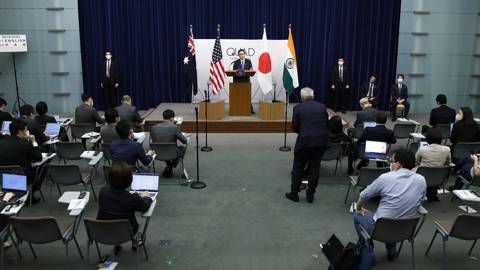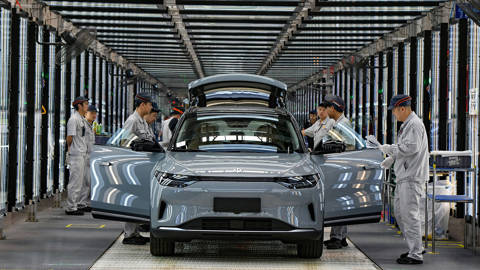It almost seems as if Japan is bent on self-isolation in Asia. After a few months during which Prime Minister Junichiro Koizumi ostensibly sought to improve his country’s relations with China, his fifth visit to the controversial Yasukuni Shrine has again raised tempers. China and South Korea both cancelled meetings of their foreign ministers with their Japanese counterpart. Once again, Japan has missed a chance to rebuild trust in a part of the world where, in the absence of cooperative international institutions, trust is all there is.
Why does Japan still not understand that the way it treats its history echoes across every part of Asia that Japan’s military occupied in the first part of the 20th century? Japanese reactions reveal an extraordinary degree of stubborn self-righteousness.
As Japan’s government never ceases to point out, the Yasukuni shrine, built in 1869, venerates the 2.5 million Japanese who have died for their country, not just the 14 judged as war criminals after WWII. But, while many Japanese feel (with some justification) that South Korea and, in particular, China, exploit the Yasukuni issue to reduce Japan’s influence in the region and to pander to their publics’ strong nationalism, they are missing the point.
Indeed, domestic politicking seems to be at least as important to Japan’s leaders as to South Koreas’s or China’s. Koizumi’s visit to the shrine, officially presented as that of a private citizen, was intended to impress the Japanese public, regardless of its effects abroad.
But the country now is isolated, which affects the whole fabric of stability in the region. Japan’s diplomatic isolation strengthens those in the Chinese leadership who have long sought to marginalize what is economically and militarily still Asia’s most powerful nation, while sucking other states in the region deeper into China’s shadow. Japan’s isolation also increases its dependency on its only ally, the United States, and undermines the fragile chance of developing a framework in Asia to address future regional crises in a spirit of cooperation rather than confrontation and rivalry.
Because Japan’s isolation is a matter not only for the Japanese, it must be a matter for Western policy. The record, however, is not impressive. The US administration, fashionably worried over China’s growing regional influence, seems quite happy with a closely-tied Japan that could help balance China. But this is obviously a shortsighted approach, for a Japan that is tied exclusively to America will lose, not gain, against China in the region, thus making the balancing act even harder.
The Europeans have no Japan policy at all, not even a shortsighted one. Fixated on the promise of an ever growing Chinese market, they give little thought to the stability of the region. They seem to think of the powers in the region as unconnected islands, and of their own behavior towards one as devoid of political consequence for the others.
When the European Union last year considered lifting its symbolic arms embargo against China, none of the governments driving the proposal bothered to consider that this, too, would be symbolic, sending a message all over Asia that Europe was putting its political weight behind Chinese regional policies. Japanese demands to reconsider fell on deaf ears, and the initiative was put on ice only when US congressmen threatened economic repercussions and China increased pressure on Taiwan.
Instead of exploiting Japan as a regional aircraft carrier, as the US tries to do, or neglecting her politically, as Europeans do, both need to work out a new, strategic approach – if possible, jointly. The aim must be to prevent a clash of nationalisms and encourage a cooperative framework in which the region’s major countries interact and develop respect for each other’s interests. Such a framework can emerge in Asia only with Japan’s active involvement, not on the basis of her isolation.
Of course, Japan must lead the way. Japan’s leaders must recognize that the mindlessness with which they still treat the sensitivities of societies that suffered from Japanese imperialism in the twentieth century is as morally deaf as it is strategically damaging. But this process of realization is more likely to succeed if Japan does not feel it stands with its back against a wall.
Friends from abroad, therefore, can assist this process by ensuring that Japan does not to feel alone. Far from endorsing Japanese lack of sensitivity, active Western political engagement – for its own credibility in Asia – must convey that Japan’s future depends on gaining the trust of the region.
That is not too much to ask. After all, Japan was a political ally throughout the half-century of the Cold War. In a part of the world where democracy is gradually advancing, Japan can point to firm democratic traditions and institutions. Its economic clout remains formidable, and its commercial and cultural ties to the West are broad and varied. Japan may have shied away for decades from sharing the task of maintaining international order, but a new awareness of international responsibility is steadily emerging.
For those who want a stable Asia, the interest in establishing close links with Japan should be obvious. This should not come at the expense of similar links with others, such as China and India, but these ties must not be acquired at the price of isolating Japan.










It almost seems as if Japan is bent on self-isolation in Asia. After a few months during which Prime Minister Junichiro Koizumi ostensibly sought to improve his country’s relations with China, his fifth visit to the controversial Yasukuni Shrine has again raised tempers. China and South Korea both cancelled meetings of their foreign ministers with their Japanese counterpart. Once again, Japan has missed a chance to rebuild trust in a part of the world where, in the absence of cooperative international institutions, trust is all there is.
Why does Japan still not understand that the way it treats its history echoes across every part of Asia that Japan’s military occupied in the first part of the 20th century? Japanese reactions reveal an extraordinary degree of stubborn self-righteousness.
As Japan’s government never ceases to point out, the Yasukuni shrine, built in 1869, venerates the 2.5 million Japanese who have died for their country, not just the 14 judged as war criminals after WWII. But, while many Japanese feel (with some justification) that South Korea and, in particular, China, exploit the Yasukuni issue to reduce Japan’s influence in the region and to pander to their publics’ strong nationalism, they are missing the point.
Indeed, domestic politicking seems to be at least as important to Japan’s leaders as to South Koreas’s or China’s. Koizumi’s visit to the shrine, officially presented as that of a private citizen, was intended to impress the Japanese public, regardless of its effects abroad.
But the country now is isolated, which affects the whole fabric of stability in the region. Japan’s diplomatic isolation strengthens those in the Chinese leadership who have long sought to marginalize what is economically and militarily still Asia’s most powerful nation, while sucking other states in the region deeper into China’s shadow. Japan’s isolation also increases its dependency on its only ally, the United States, and undermines the fragile chance of developing a framework in Asia to address future regional crises in a spirit of cooperation rather than confrontation and rivalry.
Because Japan’s isolation is a matter not only for the Japanese, it must be a matter for Western policy. The record, however, is not impressive. The US administration, fashionably worried over China’s growing regional influence, seems quite happy with a closely-tied Japan that could help balance China. But this is obviously a shortsighted approach, for a Japan that is tied exclusively to America will lose, not gain, against China in the region, thus making the balancing act even harder.
SPRING SALE: Save 40% on all new Digital or Digital Plus subscriptions
Subscribe now to gain greater access to Project Syndicate – including every commentary and our entire On Point suite of subscriber-exclusive content – starting at just $49.99.
Subscribe Now
The Europeans have no Japan policy at all, not even a shortsighted one. Fixated on the promise of an ever growing Chinese market, they give little thought to the stability of the region. They seem to think of the powers in the region as unconnected islands, and of their own behavior towards one as devoid of political consequence for the others.
When the European Union last year considered lifting its symbolic arms embargo against China, none of the governments driving the proposal bothered to consider that this, too, would be symbolic, sending a message all over Asia that Europe was putting its political weight behind Chinese regional policies. Japanese demands to reconsider fell on deaf ears, and the initiative was put on ice only when US congressmen threatened economic repercussions and China increased pressure on Taiwan.
Instead of exploiting Japan as a regional aircraft carrier, as the US tries to do, or neglecting her politically, as Europeans do, both need to work out a new, strategic approach – if possible, jointly. The aim must be to prevent a clash of nationalisms and encourage a cooperative framework in which the region’s major countries interact and develop respect for each other’s interests. Such a framework can emerge in Asia only with Japan’s active involvement, not on the basis of her isolation.
Of course, Japan must lead the way. Japan’s leaders must recognize that the mindlessness with which they still treat the sensitivities of societies that suffered from Japanese imperialism in the twentieth century is as morally deaf as it is strategically damaging. But this process of realization is more likely to succeed if Japan does not feel it stands with its back against a wall.
Friends from abroad, therefore, can assist this process by ensuring that Japan does not to feel alone. Far from endorsing Japanese lack of sensitivity, active Western political engagement – for its own credibility in Asia – must convey that Japan’s future depends on gaining the trust of the region.
That is not too much to ask. After all, Japan was a political ally throughout the half-century of the Cold War. In a part of the world where democracy is gradually advancing, Japan can point to firm democratic traditions and institutions. Its economic clout remains formidable, and its commercial and cultural ties to the West are broad and varied. Japan may have shied away for decades from sharing the task of maintaining international order, but a new awareness of international responsibility is steadily emerging.
For those who want a stable Asia, the interest in establishing close links with Japan should be obvious. This should not come at the expense of similar links with others, such as China and India, but these ties must not be acquired at the price of isolating Japan.